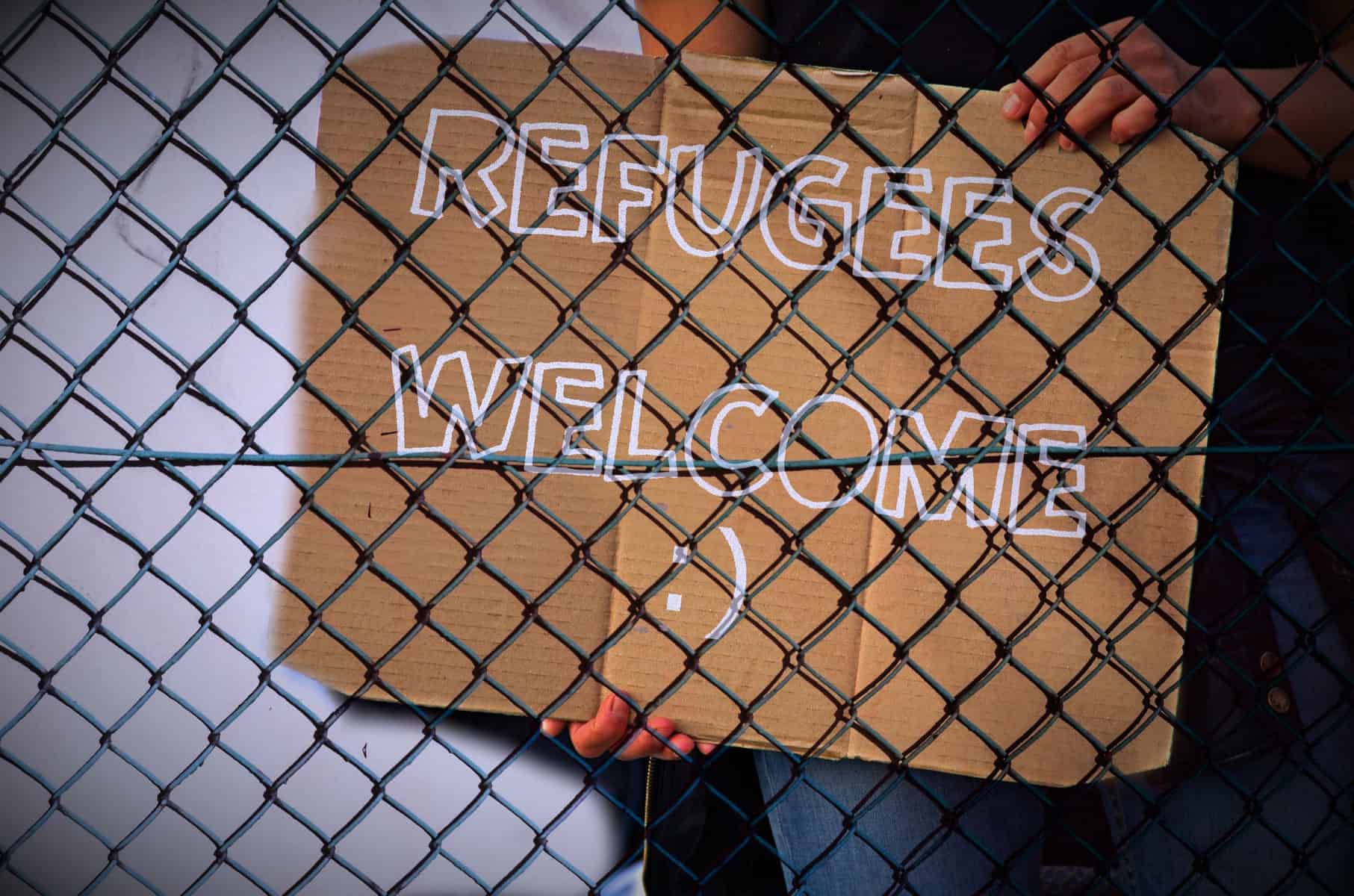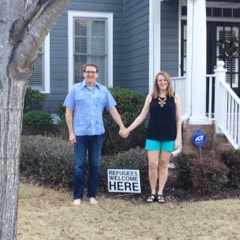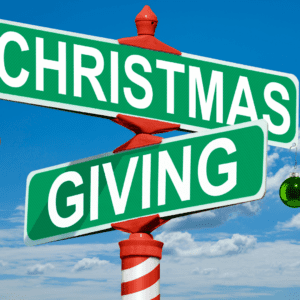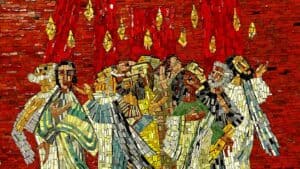
“I think I’ve changed my mind. I don’t think we should do this.” I bit my lip and put my hands in my pockets.
“Don’t be nervous. Be proud. This is who we are,” my husband said. He’s used to my last-minute jitters.
“What’s the point? Are we trouble-makers? Are we show-offs? I don’t know.” I glanced at the sign on the counter, threw my head back, and sighed.
“Come on. Let’s do this.” He headed out the front door.
That afternoon I had gone to Clarkston, Georgia with a friend of mine and all our kids to Refuge Coffee Co., the place we adopted during our Family Compassion Focus last year. I chatted with our resettled refugee friends working on the coffee truck, tried a new tea, bought some new mugs, and brought home a sign offered by World Relief Atlanta that said in clear black letters REFUGEES WELCOME HERE.
But when I saw the sign in my trunk when we got home my stomach twisted. I have never had a sign in my front yard for any reason. We sometimes fly an American flag, and a “W” flag when the Cubs win, but never anything that could be seen as remotely political or religious (well, the Cubs flag might border on religious).
I have never had a sign in my front yard for any reason.
We live in a beautiful, safe suburb, far away from the city of Atlanta and all public transportation. It started as a planned community almost 50 years ago, and affectionately refers to itself as “The Bubble.” It’s known for its golf carts, good schools, and die-hard conservative Republican values. I didn’t see one Clinton sign anywhere in town during election season, but I saw dozens of Trump signs. There were four in my picturesque, tree-lined neighborhood.
What would The Bubble think of a sign proclaiming REFUGEES WELCOME HERE?
My husband slid the skinny metal stakes into the Georgia clay. I pleaded, “No! Not like that. Not head on! Our neighbors across the street didn’t ask for this. I don’t want them to have to see it every time they look out the window.”
He adjusted the sign.
“No! Not like that either. I don’t want to shove this in anyone’s face. Let’s move it over a few feet, and at an angle so it doesn’t point at anyone’s front door?” I paused. “Or how about we don’t do this at all?”
He waited.
I knelt down, pulled the sign out of the ground, moved it over, and pivoted it to face in between two houses. My stomach flipped again. Our neighborhood’s very active, vocal HOA is not a big fan of individuality. I didn’t want any trouble.
My husband helped me up. We stepped out to the sidewalk and stared at the sign. My husband then walked back to it, and shoved the stakes deep down in the ground. We held hands and prayed. “Lord, help us live out what this sign says. For refugees we already know. For refugees we don’t know. For neighbors. For new friends. Our house belongs to you.”
“Lord, help us live out what this sign says. For refugees we already know. For refugees we don’t know. For neighbors. For new friends. Our house belongs to you.”
 We called our son out to take our picture. We posted the picture of us holding hands over the sign on Facebook and Instagram. Friends of our family and and allies of refugees liked, loved, and commented on it. It got more attention than our 20th wedding anniversary picture. It’s just a sign. But it’s also statement.
We called our son out to take our picture. We posted the picture of us holding hands over the sign on Facebook and Instagram. Friends of our family and and allies of refugees liked, loved, and commented on it. It got more attention than our 20th wedding anniversary picture. It’s just a sign. But it’s also statement.
I hardly slept that night. I fitfully dreamed about the sign being stolen, neighbors pounding on the door, angry emails, and my house being set on fire. When I got out of bed in the morning I ran down the stairs, opened the front door and checked to see if the sign was still there. It was.
And I wanted to pull it out of the clay that very second.
Our Family Compassion Focus this year is “Create Refuge”—not just for refugees, but for everyone we do life with—our friends, classmates, colleagues, grandparents, refugees, each other, and our neighbors. We want to be a big umbrella to rest under when the questions, inconveniences, and tragedies of life come pouring down. We want to be a bridge to love, understanding, and God.
We want community. I feared the sign might cut that off before it even gets started.
That first morning my daughter asked what her dad and I were whispering about, me still panting in my pajamas. I meekly said, “The sign, honey. I’m worried our REFUGEES WELCOME HERE sign will offend people. That they’ll think we’re agitators and weirdos trying to shove ideas in their faces.”
She put one hand on her hip and wagged her finger, “If anyone says we can’t have a sign in our front yard I’m going to take it and put it in my bedroom window. (Her window is in the middle of the front our house.) “What kind of person doesn’t want to help refugees anyway? Geesh.”
But no one said anything about the sign, except for the time our neighbor saw a steady stream of 12-year-old-boys tripping into our house for a church event, and wryly asked my husband, “You got some refugees coming over today?” Without missing a beat my husband joked, “Yep. All refugees. Mixing it up: some Sudanese, some Syrian, some Congolese.” They both laughed.
I bit my tongue, wanting to gush about the affection I have for the refugees we know, and maybe rattle off some facts about zero terror attacks committed by refugees. But I didn’t want him to be offended. Maybe someday when we know each other better. Hopefully soon.
I’m pretty sure people just don’t know what to make of the REFUGEES WELCOME HERE sign, and they don’t want to stir up any trouble, either. Sometime I don’t even know what I’m trying to say with the sign.
- Is it like a “Vacancy” sign for Refugees? Because I don’t ever want to say “There’s no room in the inn?”
- Is it like an Auburn or ‘Bama flag? Because I say “I’m rooting for this team! These are my people! I’m proud of them and celebrate them!”
- Is it like a fish on my car? Because I sometimes say “We are Christians. Just letting you know.”
- Is it like a peace sign? Because I really want to say, “Why can’t we all just get along, man…”
- Is it all these things?
I don’t know how long we’ll keep up the REFUGEES WELCOME HERE sign. I still think about pulling it out of the ground, all the time. But my kids want to keep it up until all our resettled refugee friends can see it. Ahmad, from Syria, saw it when he came over on Easter Sunday. But Leon, our friend from the DRC, couldn’t come over that day. So it’s still up.
In the meantime I hope we’ll have more guests over—more neighbors, out-of-towners, and born and bred Georgians. We hope our guests find refuge anytime they come over. They are all welcome here.
Aimee Fritz delights in telling long, true stories about compassion, souls, and big mistakes among the everyday absurdities of her suburban life. Long ago she consulted companies, churches, and nonprofits. Now she runs Family Compassion Focus to funnel all that into helping people become lovable and loving World Changers. She recently co-wrote the Family Toolkit (free download) for Kent Annan’s Slow Kingdom Coming: Practices for Doing Justice. Loving Mercy, and Walking Humbly in the World (IVP). To arrange a meeting, a talk, or an article, contact Aimee via e-mail (familycompassionfocus@gmail.com).


